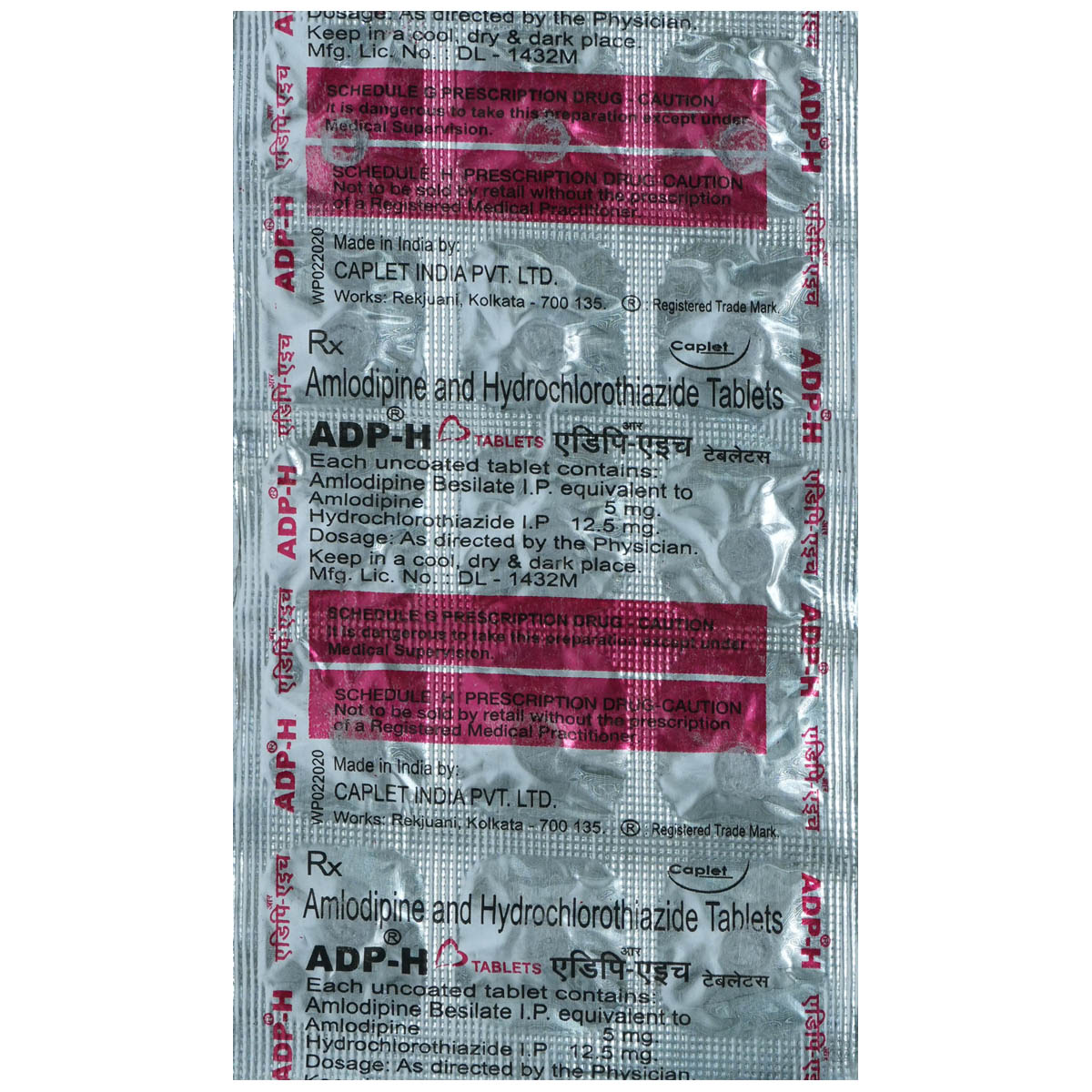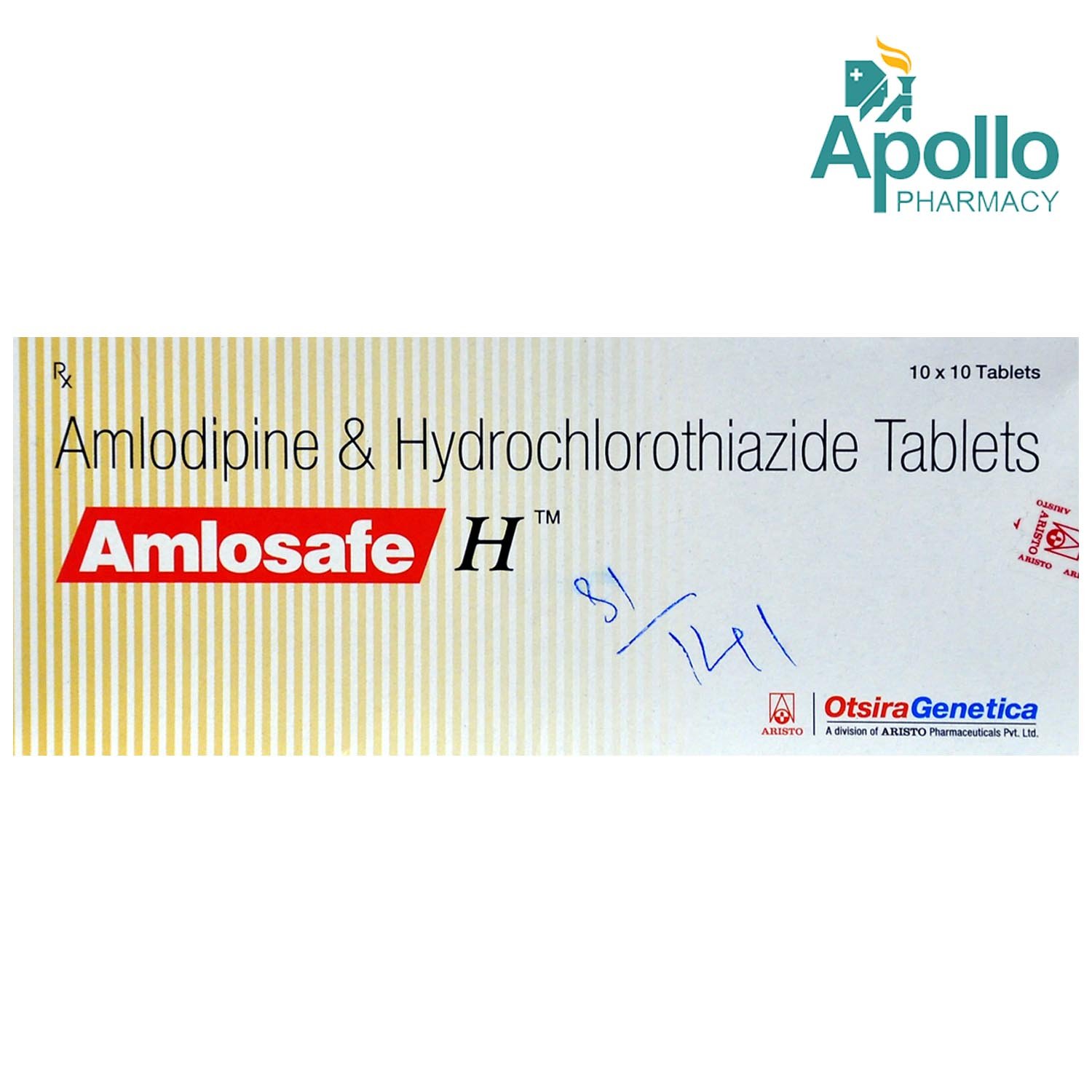Amlodipine+hydrochlorothiazide
About Amlodipine+hydrochlorothiazide
Amlodipine+hydrochlorothiazide belongs to the class of antihypertensives and is primarily used to treat hypertension (high blood pressure). Hypertension, or high blood pressure, is a chronic condition in which the force exerted by the blood against the arterial wall is high. As a result, it leads to heart disease, irregular heartbeat, and other complications.
Amlodipine+hydrochlorothiazide is a combination of two medicines, including Amlodipine and Hydrochlorothiazide. Amlodipine is a calcium channel blocker that relaxes and widens blood vessels. Hydrochlorothiazide is a diuretic that removes excess water and certain electrolytes from the body through urine. Amlodipine+hydrochlorothiazide helps lower high blood pressure, thereby reducing the risk of future heart attack and stroke.
You may experience glucose intolerance (low or high level of glucose), ankle swelling, sleepiness, headache, (sense of heat in the face, ears, neck, and trunk), flushing, tiredness, nausea, decreased potassium level in the blood, increased blood uric acid, and altered blood lipid level. Most of the side effects of Amlodipine+hydrochlorothiazide do not require medical attention and resolve gradually over time. However, if the side effects are persistent, reach out to your doctor.
Inform your doctor if you have had an allergic reaction to Amlodipine+hydrochlorothiazide, have liver disease, kidney disease, heart failure, a heart valve problem, or have a history of a heart attack. Immediately contact your doctor if you are pregnant or are planning to get pregnant, or are breastfeeding.
Do not stop taking Amlodipine+hydrochlorothiazide without your doctor's advice. If you stop taking Amlodipine+hydrochlorothiazide suddenly, it may cause changes in your heart rhythm and blood pressure, cause chest pain, or a heart attack. Your doctor will gradually lower your dose to help prevent these symptoms.
Uses of Amlodipine+hydrochlorothiazide
Medicinal Benefits
- Helps lower high blood pressure (hypertension) effectively.
- Reduces the risk of heart attack, stroke, and kidney problems caused by prolonged high blood pressure.
- Amlodipine relaxes and widens blood vessels, improving blood flow.
- Hydrochlorothiazide helps the body eliminate excess salt and water through urine, reducing fluid retention.
- Decreases strain on the heart and arteries.
- Helps control swelling (oedema) caused by fluid buildup in the body.
- Provides a combined action that enhances blood pressure control compared to single-drug therapy.
- Supports long-term cardiovascular health when taken regularly as prescribed.
Directions for Use
- Amlodipine+hydrochlorothiazide can be taken with or without food as advised by your doctor.
- Follow your doctor's instructions on the dosage and timing of this medication to ensure safety.
- Swallow Amlodipine+hydrochlorothiazide as a whole with a glass of water.
- Do not chew, crush, or break it.
Storage
Side Effects of Amlodipine+hydrochlorothiazide
- Glucose intolerance (low or high level of glucose)
- Ankle swelling
- Sleepiness
- Headache
- Flushing (sense of heat in the face, ears, neck, and trunk)
- Tiredness
- Nausea
- Decreased potassium level in the blood
- Increased blood uric acid
- Altered blood lipid level
Drug Warnings
- Amlodipine+hydrochlorothiazide should be used with extreme caution in patients with liver, kidney, cardiovascular diseases, and diabetic patients.
- Use only if the potential benefit justifies the potential risk.
- Immediately contact your doctor if you are pregnant or are planning to get pregnant, are breastfeeding.
- Do not stop taking Amlodipine+hydrochlorothiazide without your doctor's advice. If you stop taking Amlodipine+hydrochlorothiazide suddenly, it may cause changes in your heart rhythm and blood pressure, cause chest pain, or a heart attack.
Drug Interactions
Drug-Drug Interaction: Amlodipine+hydrochlorothiazide may have an interaction with medicines used to treat mood disorders such as (lithium), medicines used to treat heart disorders such as (digoxin), antidiabetic medicines such as (metformin), medicines used to treat erectile dysfunction such as (sildenafil), medicines used to lower cholesterol levels such as (simvastatin), ACE-inhibitor (such as enalapril, lisinopril, ramipril), and medicines used for immunosuppression such as (cyclosporine).
Drug-Food Interaction: Avoid foods with high fat or cholesterol. Avoid too much salt in your diet like pickles, extra salt on salad, etc. You are recommended not to consume alcohol along with Amlodipine+hydrochlorothiazide to avoid unpleasant side effects.
Drug-Disease Interaction: Amlodipine+hydrochlorothiazide should not be given to people with cardiogenic shock (when the heart fails to pump required blood to the body), heart valve problem (stenosis), low blood pressure (hypotension), liver disease, kidney disease, or heart failure, low serum potassium (hypokalemia), patients with nil urine output (anuria).
Drug-Drug Interactions Checker List:
Safety Advice

Alcohol
unsafeYou are recommended not to consume alcohol along with Amlodipine+hydrochlorothiazide to avoid unpleasant side-effects.

Pregnancy
cautionAmlodipine+hydrochlorothiazide is not recommended during pregnancy unless your doctor considers it essential. Your doctor will weigh the benefits and any potential risks before prescribing it to you.

Breast Feeding
cautionAmlodipine+hydrochlorothiazide should not be used when breastfeeding unless clearly necessary. Your doctor will weigh the benefits and any potential risks before prescribing it to you. Please consult your doctor.

Driving
cautionAmlodipine+hydrochlorothiazide may sometimes cause dizziness, nausea, tiredness or headache. Therefore, it is advised to drive only if you are alert after taking Amlodipine+hydrochlorothiazide.

Liver
cautionAmlodipine+hydrochlorothiazide to be taken with caution, especially if you have a history of liver diseases. Your doctor may adjust your dose depending on your current liver conditions.

Kidney
cautionAmlodipine+hydrochlorothiazide to be taken with caution, especially if you have a history of kidney diseases. Your doctor may adjust your dose depending on your current kidney conditions.

Children
cautionAmlodipine+hydrochlorothiazide to be taken with caution, especially if you are children below the age of 12. Your doctor may adjust your dose depending upon your age.
Habit Forming
Diet & Lifestyle Advise
- Keep your weight under control with a BMI of 19.5-24.9.
- Do regular physical activity or exercise for at least 150 minutes per week, or about 30 minutes most days. Doing this can help you lower your high blood pressure by about 5 mmHg.
- Avoid stress as it can raise your blood pressure. Try to enjoy and spend time with your loved ones to cope with stress and practice mindfulness techniques.
- Quitting smoking is the best strategy to lower the risk of heart disease.
- Option for a diet rich in whole grains, fruits, veggies, and low-fat dairy products.
- Limit your intake of sodium chloride (table salt) to 2300 mg per day or less; 1500 mg or less is ideal for most adults.
- Try to include heart-healthy omega-3 fatty acids-containing foods in your daily diet. You can also use low-fat cooking oil like olive oil, soybean oil, canola oil, and coconut oil to help lower your elevated blood pressure.
- Monitor your blood pressure daily, and if there is excessive fluctuation, contact your doctor immediately.
Special Advise
- It is advised to restrict salt intake in the diet.
Patients Concern
Disease/Condition Glossary
Hypertension: It is a chronic condition in which blood pressure is too high. This condition can lead to hardened arteries (blood vessels), decreasing the blood and oxygen flow to the heart. Blood pressure is the measurement of the force that our heart uses to pump blood to all parts of the body. Raised blood pressure can cause chest pain (angina) and a heart attack (when the blood supply to the heart is blocked). Additionally, high blood pressure also causes brain damage (stroke) and kidney failure. High blood pressure can be diagnosed with a blood pressure monitor (sphygmomanometer). Systolic pressure is the pressure when the heart pumps blood out. On the other hand, diastolic pressure is the pressure when your heart is at rest between heartbeats. If your blood pressure is 140/90 mmHg, it means the systolic pressure is 140 mmHg and the diastolic pressure is 90 mmHg. Ideal blood pressure should be between 90/60 mmHg and 120/80 mmHg.
FAQs
Amlodipine+hydrochlorothiazide is used to treat hypertension (high blood pressure).
No, you are advised to inform your doctor and monitor your blood pressure for at least two weeks before stopping the medicine. Depending on your current blood pressure readings, your doctor may lower your medication dosage and not recommend discontinuing it.
If you forget to take the Amlodipine+hydrochlorothiazide, take it as soon as you remember, then continue taking it at the usual times. Do not take a double dose to make up for a forgotten dose.
Yes, Amlodipine+hydrochlorothiazide may cause dizziness. It is advised to avoid driving or operating any heavy machinery while taking Amlodipine+hydrochlorothiazide. In case you feel dizzy or light-headed, it is advised to rest for some time until you feel better.
Amlodipine+hydrochlorothiazide can be safely taken as long as your doctor has prescribed it to you. Conditions such as high blood pressure are lifelong conditions, and one should not abruptly discontinue them without discussing it with a doctor.
No, it is a prescribed drug given by a physician to prevent specific medical conditions. Taking it on your own can cause unwanted side effects.
Take Amlodipine+hydrochlorothiazide once a day, at the same time each day, with or without food. Usually, take it in the morning to help control blood pressure throughout the day. Remember to follow your doctor's instructions and take it at the same time daily to make it a habit.
While taking Amlodipine+hydrochlorothiazide, consult your doctor before adding any supplements to control blood pressure. Supplements can interact with the medication or increase side effects. Always consult your doctor to make an informed decision and ensure safe usage. They will help you determine the best course of action.
If you feel nauseous after taking Amlodipine+hydrochlorothiazide, it's a common side effect that usually goes away with time. If it persists or bothers you, consult your doctor. In the meantime, take the tablet with food and stay hydrated to help manage nausea.
While taking Amlodipine+hydrochlorothiazide, monitoring your vital signs and health indicators is essential. This includes keeping track of your blood pressure to ensure the medication is effectively controlling your hypertension, as well as regular blood tests to check your kidney function, potassium levels, and blood sugar levels, especially if you have diabetes. Additionally, monitoring your electrolyte levels, including potassium, sodium, and chloride, will help detect any imbalances.
Try using a pill box to organize your medicines or set reminders on your phone or calendar. You can also take your medications at the same time each day or ask a family member or friend to remind you. Additionally, you can place sticky notes in visible spots or explore medication reminder apps to help you stay on track. Choose the method that works best for you.
The key active components present in Amlodipine+hydrochlorothiazide are Amlodipine and Hydrochlorothiazide, which are antihypertensive medicines. Amlodipine, a calcium channel blocker, relaxes blood vessels, improving blood flow and reducing blood pressure. Hydrochlorothiazide, a diuretic, helps remove excess fluid from the body, reducing blood volume and blood pressure. These two medicines work together synergistically to effectively manage hypertension (high blood pressure).
Common side effects of Amlodipine+hydrochlorothiazide may include glucose intolerance (low or high level of glucose), ankle swelling, sleepiness, headache (sense of heat in the face, ears, neck, and trunk), flushing, tiredness, nausea, decreased potassium level in the blood, Increased blood uric acid, and altered blood lipid level. Most of these side effects of Amlodipine+hydrochlorothiazide do not require medical attention and gradually resolve over time. However, if the side effects persist, contact your doctor.
Avoid or limit alcohol consumption while taking Amlodipine+hydrochlorothiazide. Alcohol can increase the blood pressure-lowering effect of the medication, leading to dizziness or fainting. It can also increase the risk of dehydration and electrolyte imbalances. If you do drink alcohol, do so in moderation and consult your doctor for personalized advice.
Amlodipine+hydrochlorothiazide is not recommended during pregnancy unless your doctor considers it essential. Your doctor will weigh the benefits and potential risks before prescribing it.
Amlodipine+hydrochlorothiazide should not be used when breastfeeding unless clearly necessary. Your doctor will weigh the benefits and potential risks before prescribing it. Please consult your doctor.









